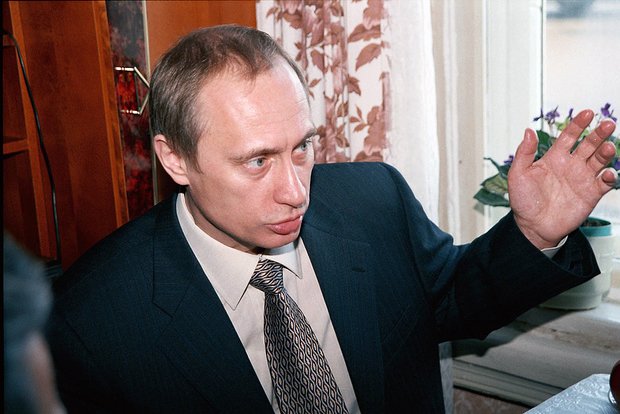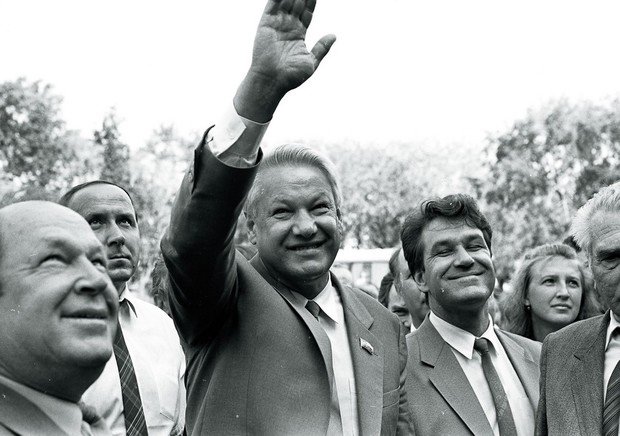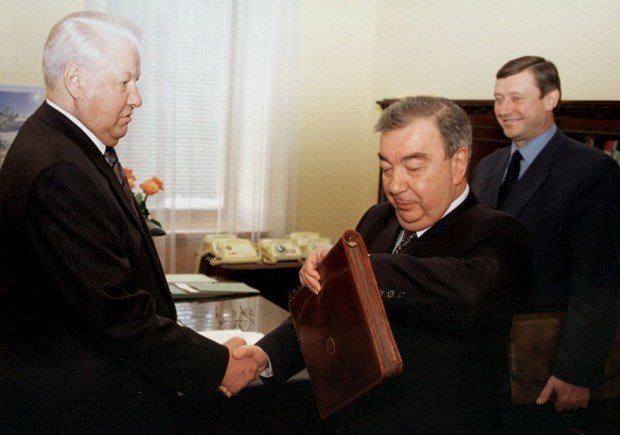Dmitry Oreshkin: 'All three peaks of Putin's popularity are associated with wars'
The Russian political expert about the circumstances under which Yeltsin delegated power to his successor and what came of it
In the historic month for new Russia of August, not only the putsch '91, the crisis '98, the Kursk tradegy and the war with Georgia took place, but also the delegation of presidential power in 1999. About how it was and why Putin became a ''strong hand'' only by 2005 – read in the interview of Realnoe Vremya with political expert Dmitry Oreshkin.
''The desire for a 'strong hand' in 1999 was artificially supported by the political establishment''
Mr. Oreshkin, exactly 19 years ago Vladimir Putin ascended the political Olympus. On 9 August 1999, when appointing the prime minister as the director of the FSB, the then head of Russia, Boris Yeltsin, named him his successor. Does Putin fit the definition of a 'strong hand', and to what extent in 1999, in a difficult time, it really was necessary for the citizens of Russia?
The desire for a 'strong hand' then was not that very strong — just by the coming of Putin to power, it captured more and more social strata of our society and, in addition, was artificially promoted by the supporters, if you prefer, of the neo-vertical. That is, the neo-political establishment, which received a much more effective model due to the presence of convertible currency, market economy and private property — just this political establishment by the end of the '90, along with the security forces, lost control of the situation in the country. There appeared oligarchs, the rich, but the power of this political establishment was weak. At that time, many books were written about the advantages of vertical management of Stalin's times, and it worked, because the time of changes was accompanied by cognitive dissonance and painful perception of people — the crash of their established ideas about changes. On the territory of the former Soviet Union, people especially believed that the time of the '90s for them was lost — their lives objectively deteriorated: earlier, for many decades it had been adapted to a fairly stable economic and social model: people achieved success, made a career (especially in the bureaucracy, science and military industry), realized themselves, subordinating themselves to this model, and suddenly it all collapsed. Yes, the USSR collapsed purely for objective economic reasons: the price of oil fell, American sanctions were in effect, unlimited money issue was introduced, there was a commodity deficit, but people began to perceive it as the collapse of the world! Well, whether you are a miner or an oilman, you are in the ranks of the honourable working class — you produce coal, produce oil, but soon it turns out that oil and coal are not so necessary for the country as before.
But in 1991-1992, by the way, and what is surprising — people did not feel a disaster after the collapse of the USSR, they lived in the hope of an early arrival of better life than it was under socialism.
It is absolutely true — people understood that the Soviet system was already deadlocked. According to the VTSIOM in the late '80s-early '90s, the problem of the collapse of the USSR took the sixth or seventh place in the list of concerns of the Soviet people. They were primarily concerned about the lack of necessary products: food, children's shoes, notebooks, books, in addition, people feared a war, they were concerned about personal safety due to the surge of street crime, worried about the topic of making money, and only then they were concerned about the collapse of the USSR. But by 1999, the collapse of the Soviet Union, as it turned out due to the effort of a number of propagandists, was the biggest pain of the respondents. What kind of propagandists — you ask. Not purely Yeltsin's, but propagandists of special services, which are increasingly, after the election 1996, began to tell that we had a great state, everyone feared and respected us, and that we consider to be a disaster that it ceased to exist.

''The desire for a 'strong hand' then was not that very strong — just by the coming of Putin to power, it captured more and more social strata of our society.'' Photo: Mikhail Kozlovsky (Vladimir Putin in Tatarstan, 21 March 2000)
''Failing to obtain Svyazinvest, Berezovsky began to use ORT Channel to discredit Yeltsin''
Still, I would like to understand what year or what event in the 1990s served as a starting point for the growth of sympathy for the USSR and the desire for a ''strong hand''? The crisis 1998, coming of ''red'' Primakov's Cabinet? Or did it all start earlier — with the First Chechen war?
In the early '90s, Boris Yeltsin was like a beacon of light. 'We should live differently' — so even many representatives of the intelligence services thought, even from the days of Andropov. Yeltsin was a consensus for these people — it seemed to us that if we remove two restraining ''weights'' on the feet of the country — the sixth article of the Constitution on the leadership and indicating the role of the CPSU and the planned economy, then everything would be fine. This had a lot of common sense, but not everything — Bangladesh did not have the leading role of the CPSU and there was a market economy, but the country remained Bangladesh and nothing more. But it seemed to us that we would become a developed country like the United States. But we could not become a second USA, because we were more equal to them only in rockets. But people didn't understand it — they lived for years in the country where it was often impossible to buy meat, lived for years in housing inconveniences. And as soon as some of these problems were gone, there appeared others — a neighbour who was selling junk from Turkey could buy meat, and a worker from a factory could not, the neighbour bought a car and a land plot with a fence outside the city, but the worker — neither of the other, and it was wildly unfair. Well, the propagandists began to tell that there were products in the stores not because there became more products, but because people couldn't buy them.
This propaganda began in 1997, when the conflict within the new Yeltsin elites began, oddly enough. Berezovsky, as a member of Yeltsin's team, believed that he had won the elections '96 and he was entitled to own the large company Svyazinvest for free, but Chubais, as responsible for this case, believed that the company would go to the one who won the competition. Chubais convinced Yeltsin that it was wrong to give the company for free, as the state needed money. They both remembered that the bail auctions, in which large bankers got shares of a number of major oil companies, were held in an economically and politically suboptimal way for the state, and believed that that time the state property should be sold only for money. In response to this, in 1997 Berezovsky began using his ORT Channel to discredit Yeltsin — the air began to show how the president drunken was conducting the orchestra, how he was peeing on a wheel of an aircraft, and this was the beginning of the propaganda campaign against Yeltsin.
And the crisis of 1998 hit him even more painfully — it was time of the break of the whole system of values: on TV they began to say that instead of ''successful'' people of this time, some ''kinder surprises'' came to power, and people all over the country suddenly began to look for explanations for all this. People looked for, and they began to help them – they began to suddenly tell that earlier in the country in the USSR there was an order, we were the leaders, and here the effect of public opinion worked. This effect has been strengthening more and more in the society since 1998.

''In the early '90s, Boris Yeltsin was like a beacon of light. 'We should live differently' — many representatives of the special services believed this at that time, since the time of Andropov.'' Photo: Mikhail Kozlovsky (Boris Yeltsin in Tatarstan, August 1990)
''In his first term, Putin was a 'light-winged moth''
Was Putin's candidacy as a person who is able to show the necessary qualities of a strong leader of the country offered to Yeltsin by representatives of law enforcement agencies? Or is it still the same Berezovsky, as some experts believe? Or was it more complicated?
Everything really was more complicated. Of course, Putin was offered by people who were brought up on Soviet ideas about how the state should work — it's military, security forces, bureaucracy: they really saw at that moment the threat of the collapse of the country. The officials saw the ''parade of sovereignties'' during the collapse of the Soviet Union, they saw that in the early '90s your Tatarstan also began to afford itself too much — your authorities offered to charge a fee for the passage of trains from Moscow to Vladivostok because they considered Tatarstan a sovereign state. Of course, Yeltsin and Shaimiev managed to come to an agreement later, but the federal centre had to sacrifice a lot because Shaimiev was a tough negotiator and demanded a lot for the republic.
But you see, in 1999, many in the Kremlin wanted to see in the president's chair not so much a ''strong hand'' as the heir to Yeltsin. And Putin in the first term was such. Left-wing writer Alexander Prokhanov at the beginning of the 2000s compared him with a light-wing moth, who was indifferent to the fate of the great country, and Prokhanov ''threw mud'' at Putin as much as at ''comrade'' Yeltsin. Because comrade Prokhanov needed a heavy man with the gait of comrade Stalin!
Prokhanov could be understood — Putin was from the environment of Sobchak, the man who was engaged in privatization and international activities in St. Petersburg, the man who has a good education, interesting, unusual, bright speech, sports appearance, and this man quite fit for the role of a democratic leader. Yeah, he used to work in the KGB, so what.
Did Yeltsin really take Putin's promise to guarantee him immunity from political persecution?
Others could also promise him guarantees in the struggle for political leadership. Couldn't Chernomyrdin do this? Or Stepashin? Nemtsov? Another question is whether it was possible to trust these promises. By the way, Putin fulfilled all his promises regarding Yeltsin while he was alive. It is only after the death of Yeltsin there began stories about the tumultuous 1990s.
So, it is impossible to say that Putin was a ''strong hand'' from 1999 to 2004? Was he really a pure successor to Yeltsin?
Certainly. Look, in 2000 in his first address to the parliament, Putin said the right thing: that the state should be strengthened. For example, business development requires legal solutions, it is necessary to fight corruption, and this requires a strong state, it is necessary to fight crime, and this requires a strong state, and it is necessary to reduce the tax pressure on business, and this requires an effective tax system of the state. People also agreed with this, and I would also agree that the state should be effective. But the concept of ''efficiency'' has many different meanings; for some, an effective model is, for example, Stalin's. As a strong leader, as a strong hand, Mr. Putin was identified only by 2005, and in 2007, having delivered the Munich speech, he felt himself strong. But before that, the economy was growing despite Putin — it was growing under Prime Minister Primakov, then under Prime Minister Kasyanov because under Primakov many new economic objects began to work, and under Kasyanov the oil prices began to grow.

The economy was growing despite Putin — it was growing under Prime Minister Primakov, then under Prime Minister Kasyanov, because under Primakov many new economic objects began to work, and under Kasyanov oil prices began to grow
So what was Putin's power in 2005?
All three peaks of Putin's popularity are associated with wars. Putin won in Chechnya, and this caused a surge of patriotic sentiments: the Yeltsin era, in addition to the turmoil in the economy, was overshadowed by the Chechen war, there was a feeling that the country was disintegrating. And the First Chechen war aroused a sense of the destruction of the country. Putin gave a sense of victory, despite the crisis with Kursk. The remaining bursts of Putin's popularity are related to the war with Georgia in 2008 and the Ukrainian events of 2014.
The primary need — to eat, to buy food, to buy some housing and some clothes — was satisfied thanks to the market economy, and as the economy was growing, Putin allowed himself to concentrate on Soviet values.
To be continued